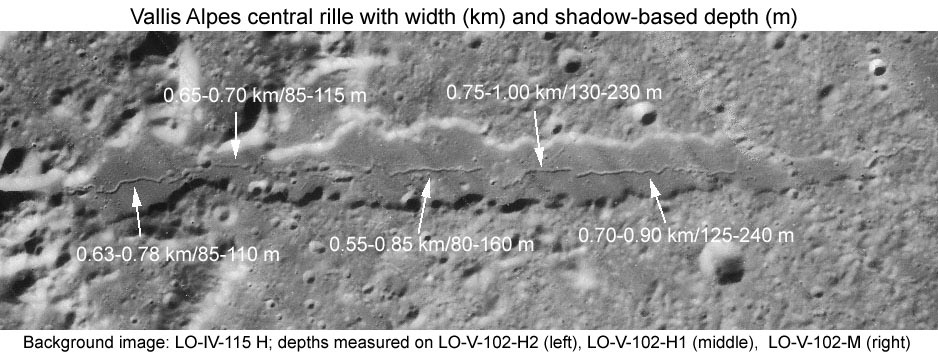Difference between revisions of "November 11, 2017"
| Line 7: | Line 7: | ||
<em>Lunar Orbiter IV 115H image from [http://www.lpi.usra.edu/resources/lunar_orbiter/ Lunar & Planetary Institute], annotations by [mailto:jimmosher@yahoo.com Jim Mosher]</em><br /> | <em>Lunar Orbiter IV 115H image from [http://www.lpi.usra.edu/resources/lunar_orbiter/ Lunar & Planetary Institute], annotations by [mailto:jimmosher@yahoo.com Jim Mosher]</em><br /> | ||
<br /> | <br /> | ||
| − | Stellar observers have multitudes of targets to test their visual acuity: stars of accurately measured magnitudes. Similarly, lunar observers and imagers have lots of tiny craters and rilles, but their dimensions generally are not accurately known. LPOD previously [[May_1,_2004|published]] a diameter sequence for small craters in Serenitatis, and Mardi Clark has created four [http://www.cityastronomy.com/crater-sequence.htm more] sequences with many more craters. Recently Jim Mosher added two pages to the [https://the-moon.us/wiki/Introduction Moon Wiki] expanding the list of known diameter targets to [https://the-moon.us/wiki/ | + | Stellar observers have multitudes of targets to test their visual acuity: stars of accurately measured magnitudes. Similarly, lunar observers and imagers have lots of tiny craters and rilles, but their dimensions generally are not accurately known. LPOD previously [[May_1,_2004|published]] a diameter sequence for small craters in Serenitatis, and Mardi Clark has created four [http://www.cityastronomy.com/crater-sequence.htm more] sequences with many more craters. Recently Jim Mosher added two pages to the [https://the-moon.us/wiki/Introduction Moon Wiki] expanding the list of known diameter targets to [https://the-moon.us/wiki/Plato_craterlets Plato] and the narrow rille within the Alpine Valley. Rilles are so thin that it is difficult to make accurate measures of their widths without using spacecraft images, and many rilles even have poorly estimated lengths, and few have any depth measurements at all! So Jim has used his [http://www.henriksucla.dk/ LTVT] program to determine all three measures for the [https://the-moon.us/wiki/Alpine_Valley_Central_Rille Alpine Valley Rille]. Surprisingly, he finds that the rille is less than 1 km wide nearly everywhere along its 142 km length. I say <em>surprisingly</em> because it is being successfully [[October_20,_2006|known rilles]] had their dimensions measured on spacecraft images using LTVT...<br /> |
<br /> | <br /> | ||
<em>Chuck Wood</em><br /> | <em>Chuck Wood</em><br /> | ||
Latest revision as of 17:54, 13 October 2018
A Rille Runs Through It
Originally published May 6, 2008

Lunar Orbiter IV 115H image from Lunar & Planetary Institute, annotations by Jim Mosher
Stellar observers have multitudes of targets to test their visual acuity: stars of accurately measured magnitudes. Similarly, lunar observers and imagers have lots of tiny craters and rilles, but their dimensions generally are not accurately known. LPOD previously published a diameter sequence for small craters in Serenitatis, and Mardi Clark has created four more sequences with many more craters. Recently Jim Mosher added two pages to the Moon Wiki expanding the list of known diameter targets to Plato and the narrow rille within the Alpine Valley. Rilles are so thin that it is difficult to make accurate measures of their widths without using spacecraft images, and many rilles even have poorly estimated lengths, and few have any depth measurements at all! So Jim has used his LTVT program to determine all three measures for the Alpine Valley Rille. Surprisingly, he finds that the rille is less than 1 km wide nearly everywhere along its 142 km length. I say surprisingly because it is being successfully known rilles had their dimensions measured on spacecraft images using LTVT...
Chuck Wood
Related Links
Rükl plate 4
Yesterday's LPOD: Is This Yours?
Tomorrow's LPOD: In the Cobra's Mouth
COMMENTS
(1) Chuck--Jim's measurements are very interesting and useful for describing the Alpine Valley. Is the Alpine Valley rille considered a collapsed lava tube? Was the valley once a channel for lava flowing between Mare Imbrium and Mare Frigoris?
--Bill
(2) Bill - All sinuous rilles are thought to be lava channels and/or collapsed lava tubes. The Valley is floored by lava but it does not connect to Mare Frigoris. And there is such a narrow opening at the Imbrium end it doesn't seem that much lava could have come from there. The lava probably rose up a fracture associated with the Valley, flooding from below.
--Chuck
COMMENTS?
Register, Log in, and join in the comments.



